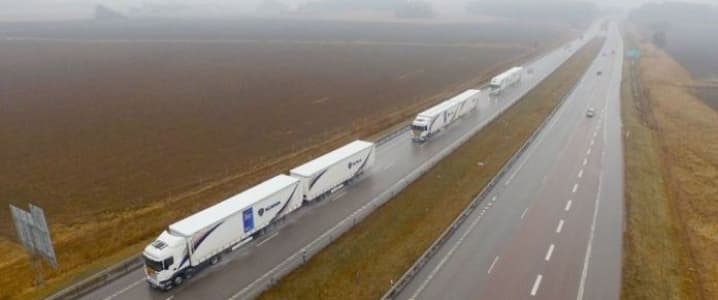As Tesla prepares to jump into the electric truck market, Daimler is poised and ready to take on the competition.
Daimler, the parent company of Mercedes-Benz, has been investing heavily in the global truck business for years. The German automaker now has five commercial truck brands: Mercedes-Benz Trucks, Freightliner Trucks, Mitsubishi FUSO, Western Star, and BharatBenz.
Freightliner has 40 percent market share in the U.S. heavy duty vehicle market.
In an April Twitter post, Tesla CEO Elon Musk said that a Tesla semi-truck reveal has been set for September. And that the company’s truck team has done “an amazing job. Seriously next level.”
As for a pickup truck, that will be rolling out in 18 to 24 months from April, Musk said.
Tesla is preparing to meet demand in global markets like the U.S., Europe, and China, where vehicle emissions rules are getting tighter. Most of these trucks are diesel powered, which has fallen out of favor during the Volkswagen diesel emissions cheating scandal. Electric trucks are much more viable now with fleet operators.
Daimler is making inroads to the electrified truck market. The company introduced its eCanter light duty electric truck last September. Since then, it has accumulated over 37,000 miles of testing on public roads in Germany and in Portugal.
Full production will be ready for 2019 – the same year the U.S. electric automaker has committed to bring the Tesla Semi to market.
The eCanter can go about 60 miles on a charge, which is considered to be more than adequate for daily urban deliveries. Recharging can take place in about an hour through fast-charging equipment.
Daimler has also been testing out its medium duty Urban eTruck in German. That electric truck will be launched in the market during 2020, the vehicle maker said.
Related: Solar And Wind Revolution Happening Much Faster Than Expected
Tesla has been in competition in the trucking space for a while now. Last year in July, Musk confirmed that Jerome Guillen was in charge of the Tesla Semi program. Guillen had been a longtime engineer at Daimler, and had led the development of the successful Cascadia truck.
Marc Llistosella, head of Daimler Trucks Asia, isn’t concerned that Tesla can bump Daimler out of the trucking space.
“In trucks, of course [Elon Musk’s] stepping into it, but we don’t see him as someone who is threatening us because you need a whole infrastructure. You need dealerships, you need infrastructure, you need maintenance,” Listosella told the press this week.
There’s a clear distinction between consumer goods like the Tesla Model S and upcoming Model 3 – and industrial goods like the Tesla Semi or the Mercedes-Benz Urban eTruck.
Daimler is ready for the competition, he said, and will stand out in that market.
“In class 8, with Freightliner, we are the #1 in America, so we have something to defend,” Llistosella said. “In the smaller ones, the game is just starting.”
ADVERTISEMENT
He does see the appeal of electric trucks showing up in their lifespan benefits.
The total cost of owning an electric truck can be significantly lower than a diesel truck once lower costs of maintenance and the diesel fuel are factored in.
Daimler wants to be ready to meet that growing demand.
By Jon LeSage for Oilprice.com
More Top Reads From Oilprice.com:
- Cuba Scrambles As Venezuela’s Oil Industry Collapses
- Is Big Oil’s Bet On Petrochemicals A Bust?
- Reviving Indonesia’s Lagging Oil Sector



















So by now, I really don't give credence to any press release /interview of any established car maker any longer. For this case in particular, keep in mind that several high-profile customers in Germany couldn't compel Daimler to produce a viable BEV truck: it got to the point where the German postal services (Deutsche Post) created a new company that is developing and producing BEV trucks for them. And guess what? They recently started to sell them to 3rd parties. This really doesn't look like Daimler has the market cornered...
Having said this: The thing here is BEVs vs. ICE - the more BEV options, the more dangerous to oil demand. And the one who cracks the Class 8 Semi truck market will destroy quite a bit of oil market forever.
If Tesla captures just 10% of the semi market, it could destroy up to 700kb/d of diesel demand per year, 2 b/d per long range truck. If Daimler and Cummins wish to defend market share with long-haul electrics, this will multiply the impact on oil demand.
60 miles? Must be a misprint!
“The use of batteries to power heavy duty trucks would be very expensive. They would also be so large and heavy that the trucks’ payload capacity would be considerably reduced. We have to obey the laws of physics and respect material-related constraints.” -- Anders Ødegård